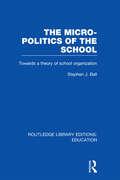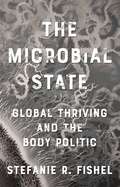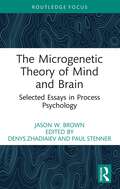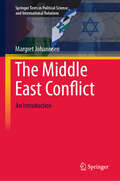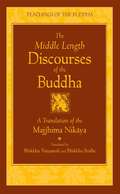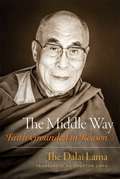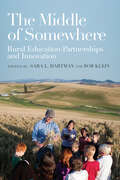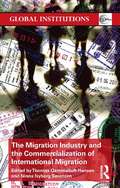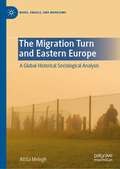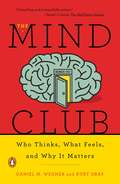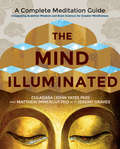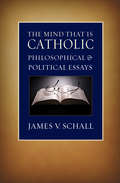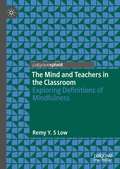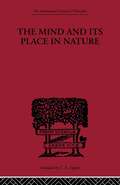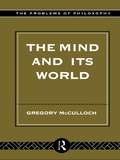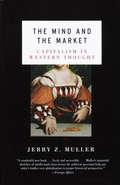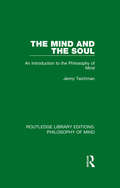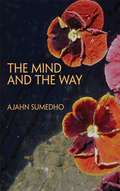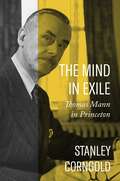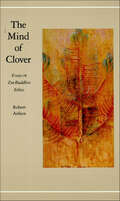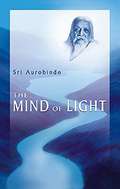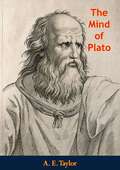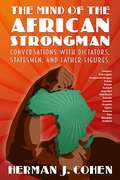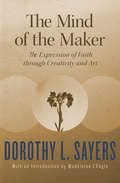- Table View
- List View
The Micro-Politics of the School: Towards a Theory of School Organization (Routledge Library Editions: Education)
by Stephen J. BallStephen Ball’s micro-political theory of school organization is a radical departure from traditional theories. He rejects a prescriptive ‘top down’ approach and directly addresses the interest and concerns of teachers and current problems facing schools. In doing so he raises question about the adequacy and appropriateness of the existing forms of organizational control in schools. Through case studies and interviews with teachers, the book captures the flavour of real conflicts in schools – particularly in times of falling rolls, change of leadership or amalgamations – when teachers’ autonomy seems to be at stake.
The Microbial State: Global Thriving and the Body Politic
by Stefanie R. FishelFor three centuries, concepts of the state have been animated by one of the most powerful metaphors in politics: the body politic, a claustrophobic and bounded image of sovereignty. Climate change, neoliberalism, mass migration, and other aspects of the late Anthropocene have increasingly revealed the limitations of this metaphor. Just as the human body is not whole and separate from other bodies—comprising microbes, bacteria, water, and radioactive isotopes—Stefanie R. Fishel argues that the body politic of the state exists in dense entanglement with other communities and forms of life. Drawing on insights from continental philosophy, science and technology studies, and international relations theory, this path-breaking book critiques the concept of the body politic on the grounds of its very materiality. Fishel both redefines and extends the metaphor of the body politic and its role in understanding an increasingly posthuman, globalized world politics. By conceiving of bodies and states as lively vessels, living harmoniously with multiplicity and the biosphere, she argues that a radical shift in metaphors can challenge a politics based on fear to open new forms of global political practice and community. Reframing the concept of the body politic to accommodate greater levels of complexity, Fishel suggests, will result in new configurations for the political and social organization necessary to build a world in which the planet&’s inhabitants do not merely live but actively thrive.
The Microgenetic Theory of Mind and Brain: Selected Essays in Process Psychology
by Jason W. BrownThis book asks where ideas, objects and feelings come from and how they arise via an exploration of the nature of subjective experience and its relation to the world. Seeking an explanation for the experience of subjective duration and the present and in contrast to the conception of mental events as non-temporal logical solids, it explores a diachronic processual theory founded on psychological data and clinical observation that provides an explanatory “system” of thought adequate to the phenomena it is called on to explain. The author focuses on the intra-psychic sources and nature of subjective experience, with the intent of examining a variety of phenomena from the standpoint of microgenetic theory. The chapters deal with the origins of human subjectivity and the epochal nature of time and duration, change and the relevance of a theory of the mental state to dream and the waking present. Based on speculative psychology that flows from case studies in neuropsychology and concepts in process philosophy, it advances a theory of mind and brain that brings together previous, fragmentary research studies on this topic.
The Middle East Conflict: An Introduction (Springer Texts in Political Science and International Relations)
by Margret JohannsenThis textbook deals with the Middle East conflict as a key element of international relations. The origins of the conflict and its international dimensions, the major Israeli-Arab wars, attempts at a solution, peace plans and visions for the future are presented in a concise manner. Extensive map material illustrates the findings.The English translation of this book, originally in German, was facilitated by artificial intelligence. The content was later revised by the author for accuracy.
The Middle Length Discourses of the Buddha: A Translation of the Majjhima Nikaya (The Teachings of the Buddha)
by Bhikkhu Bodhi Bhikkhu NanamoliThis book offers a complete translation of the Majjhima Nikaya, or Middle Length Discourses of the Buddha, one of the major collections of texts in the Pali Canon, the authorized scriptures of Theravada Buddhism. This collection--among the oldest records of the historical Buddha's original teachings--consists of 152 suttas or discourses of middle length, distinguished as such from the longer and shorter suttas of the other collections. The Majjhima Nikaya might be concisely described as the Buddhist scripture that combines the richest variety of contextual settings with the deepest and most comprehensive assortment of teachings. These teachings, which range from basic ethics to instructions in meditation and liberating insight, unfold in a fascinating procession of scenarios that show the Buddha in living dialogue with people from many different strata of ancient Indian society: with kings and princes, priests and ascetics, simple villagers and erudite philosophers. Replete with drama, reasoned argument, and illuminating parable and simile, these discourses exhibit the Buddha in the full glory of his resplendent wisdom, majestic sublimity, and compassionate humanity. The translation is based on an original draft translation left by the English scholar-monk Bhikkhu Nanamoli, which has been edited and revised by the American monk Bhikkhu Bodhi, who provides a long introduction and helpful explanatory notes. Combining lucidity of expression with accuracy, this translation enables the Buddha to speak across twenty-five centuries in language that addresses the most pressing concerns of the contemporary reader seeking clarification of the timeless issues of truth, value, and the proper conduct of life. Winner of the 1995 Choice Magazine Outstanding Academic Book Award, and the Tricycle Prize for Excellence in Buddhist Publishing for Dharma Discourse.
The Middle Way
by Thupten Jinpa His Holiness the Dalai LamaThe Dalai Lama opens The Middle Way with an elegant argument for the power of compassion in cultivating a happy life. From there, he connects core ideas of Buddhist philosophy to the truths of our shared condition. His Holiness delivers a sparklingly clear teaching on how the Buddhist ideas of emptiness and interdependency relate to personal experience and bring a deeper understanding of the world around us. In down-to-earth style, this book sets forth a comprehensive explanation of the foundational teachings of the Mahayana tradition based on the works of two of Buddhism's most revered figures. Using Nagarjuna's Middle Way, the Dalai Lama explores Buddhist understandings of selflessness, dependent origination, and the causal processes that lock us in cycles of suffering. He grounds these heady philosophical discussions using Tsongkhapa's Three Principal Aspects of the Path, presenting a brief explanation of how to put ethical discipline, wisdom, and compassion into practice. Through these beautifully complementary teachings, His Holiness urges us to strive, "with an objective mind, endowed with a curious skepticism, to engage in careful analysis and seek the reasons behind our beliefs."
The Middle of Somewhere: Rural Education Partnerships and Innovation
by Sara L. Hartman and Bob KleinHighlights innovative partnership practices that help create educational opportunities for students in rural schools across the United States.As editors Sara L. Hartman and Bob Klein acknowledge, rural places have long experienced systemic inequities that decrease rural students' access to education, yet many rural schools and communities have found creative means to make up for the dearth of outside resources. The Middle of Somewhere brings to light a wide variety of partnerships that have been forged between K–12 schools, communities, and postsecondary institutions to improve educational access. The book showcases collaborations that address three different areas of need: partnerships that prepare and support teacher candidates and educators who work in rural areas; partnerships that extend the work of rural education networks; and partnerships that promote equity, justice, and inclusion within rural populations. Using case studies of rural educational partnerships from communities across the United States, the book's contributors share their experiences of how strong partnerships have formed both organically and through thoughtful and intentional planning, and they recommend supportive strategies for their development and sustainment. The contributors also explore the many ways in which university–school–community partnerships incubate solutions to challenges common to rural education systems, such as access to STEM education and higher education. The programs featured here may serve as replicable models for practitioners, researchers, and policy makers who want to enrich the experiences of children in their schools and communities.
The Migration Industry and the Commercialization of International Migration (Global Institutions)
by Thomas Gammeltoft-Hansen Ninna Nyberg SørensenMigration has become business, big business. Over the last few decades a host of new business opportunities have emerged that capitalize both on the migrants’ desires to migrate and the struggle by governments to manage migration. From the rapid growth of specialized transportation and labour immigration companies, to multinational companies managing detention centres or establishing border security, to the organized criminal networks profiting from human smuggling and trafficking, we are currently witnessing a growing commercialization of international migration. This volume claims that today it is almost impossible to speak of migration without also speaking of the migration industry. Yet, acknowledging the role the migration industry plays prompts a number of questions that have so far received only limited attention among scholars and policy makers. The book offers new concepts and theory for the study of international migration by bringing together cross-disciplinary theoretical explorations and original case studies. It also provides a global coverage of the phenomena under study, covering migrant destinations in Europe, the United States and Asia, and migrant sending regions in Africa, Asia and Latin America.
The Migration Turn and Eastern Europe: A Global Historical Sociological Analysis (Marx, Engels, and Marxisms)
by Attila MeleghUsing Marxist and Polanyian frameworks, this book examines the structural and discursive transformation that can explain the polarization of migration debates and within the rise of nationalist anti-migrant discourses in Europe with a special attention to Eastern Europe and Hungary. It goes beyond the mainstream explanations of these phenomena that uses nationalist propaganda as causal factors and instead argues that the rise of anti-immigration currents cannot be understood without a dialectical and historical analysis of the material and discursive transformations, most importantly marketization and related reification. Drawing from thinkers such as Lukács, Polanyi, and Gramsci as well as diverse empirical sources including demographic studies, historical modelling, and discourse analyses, Migration Turn and Eastern Europe is a unique and rigorous study of one of the most pressing and puzzling political and sociological questions of our time.
The Mind Club: Who Thinks, What Feels, and Why It Matters
by Daniel M. Wegner Kurt Gray"Daniel Wegner was one of psychology's most creative minds, and Kurt Gray was one of his most creative collaborators. The Mind Club describes their biggest idea together using thought-provoking examples, clever writing, and brilliant experiments. Essential reading for anyone who owns a mind and wants to know how to use it!"--Nicholas Epley, Professor of Behavioral Science, University of Chicago Booth School of Business and author of MindwiseFrom dogs to gods, the science of understanding mysterious minds--including your own. Nothing seems more real than the minds of other people. When you consider what your boss is thinking or whether your spouse is happy, you are admitting them into the "mind club." It's easy to assume other humans can think and feel, but what about a cow, a computer, a corporation? What kinds of mind do they have? Daniel M. Wegner and Kurt Gray are award-winning psychologists who have discovered that minds--while incredibly important--are a matter of perception. Their research opens a trove of new findings, with insights into human behavior that are fascinating, frightening and funny. The Mind Club explains why we love some animals and eat others, why people debate the existence of God so intensely, how good people can be so cruel, and why robots make such poor lovers. By investigating the mind perception of extraordinary targets--animals, machines, comatose people, god--Wegner and Gray explain what it means to have a mind, and why it matters so much. Fusing cutting-edge research and personal anecdotes, The Mind Club explores the moral dimensions of mind perception with wit and compassion, revealing the surprisingly simple basis for what compels us to love and hate, to harm and to protect.From the Hardcover edition.
The Mind Illuminated: A Complete Meditation Guide Integrating Buddhist Wisdom and Brain Science for Greater Mindfulness
by Matthew Immergut CuladasaThe Mind Illuminated is a comprehensive, accessible and - above all - effective book on meditation, providing a nuts-and-bolts stage-based system that helps all levels of meditators establish and deepen their practice. Providing step-by-step guidance for every stage of the meditation path, this uniquely comprehensive guide for a Western audience combines the wisdom from the teachings of the Buddha with the latest research in cognitive psychology and neuroscience. Clear and friendly, this in-depth practice manual builds on the nine-stage model of meditation originally articulated by the ancient Indian sage Asanga, crystallizing the entire meditative journey into 10 clearly-defined stages. The book also introduces a new and fascinating model of how the mind works, and uses illustrations and charts to help the reader work through each stage. This manual is an essential read for the beginner to the seasoned veteran of meditation.
The Mind That Is Catholic: Philosophical & Political Essays
by James V. SchallIn this wide-ranging collection of philosophical essays, the acclaimed Catholic intellectual presents his vision of Catholic thought applied in the world. In The Mind That Is Catholic, political philosopher and Catholic intellectual James V. Schall presents a retrospective collection of his academic and literary essays written in the past fifty years. In these essays, exploring topics from war to friendship, philosophy, politics, and everyday living, Schall exemplifies the Catholic mind at its best. According to Schall, the Catholic mind seeks to recognize a consistent and coherent relation between the solid things of reason and the definite facts of revelation. It seeks to understand how they belong together, each profiting from the other. It respects what can be known by faith alone, but does not exclude the intelligibility of what is revealed. In these contemplative and insightful essays, Schall shares a lifetime of study in political philosophy, a wide-ranging discipline and perhaps the most vital context in which reason and revelation meet. &“Father James V. Schall is one of the few renaissance men still among us. His knowledge of various areas of reality and human endeavor is encyclopedic.&” ―Kenneth Baker, S.J., editor, Homiletic & Pastoral Review
The Mind and Its Depths
by Richard WollheimThis book brings together Wollheim's broad and abiding concerns to illuminate human thought at its furthest reaches of introspection and expression. Interweaving philosophy, psychoanalysis, and aesthetics, these essays reveal the critical connections between ideas and disciplines too often regarded as separate and distinct.
The Mind and Teachers in the Classroom: Exploring Definitions of Mindfulness
by Remy Y. LowThis book explores what mindfulness could mean for teachers and educational researchers. Moving beyond popular platitudes about mindfulness, the author provides a conceptual map for understanding the different ways in which mindfulness can be recommended to teachers. Covering the key features of Buddhist, psychological and socially engaged forms of mindfulness, this book critically examines the different ways mindfulness is defined, what problems it is meant to address, and the ways that claims about mindfulness are made. It argues that each approach to mindfulness implies an ideal of what a ‘good teacher’ should be. It will be of interest and value to teacher educators, educational researchers and scholars of mindfulness within education.
The Mind and its Place in Nature (International Library of Philosophy)
by C.D. BroadFirst published in 2000. Routledge is an imprint of Taylor & Francis, an informa company.
The Mind and its World (Problems of Philosophy)
by Gregory McCullochFirst published in 1995. Routledge is an imprint of Taylor & Francis, an informa company.
The Mind and the Market
by Jerry Z. MullerCapitalism has never been a subject for economists alone. Philosophers, politicians, poets and social scientists have debated the cultural, moral, and political effects of capitalism for centuries, and their claims have been many and diverse. The Mind and the Market is a remarkable history of how the idea of capitalism has developed in Western thought.Ranging across an ideological spectrum that includes Hobbes, Voltaire, Adam Smith, Edmund Burke, Hegel, Marx, and Matthew Arnold, as well as twentieth-century communist, fascist, and neoliberal intellectuals, historian Jerry Muller examines a fascinating thread of ideas about the ramifications of capitalism and its future implications. This is an engaging and accessible history of ideas that reverberate throughout everyday life.From the Trade Paperback edition.
The Mind and the Soul: An Introduction to the Philosophy of Mind (Routledge Library Editions: Philosophy of Mind)
by Jenny TeichmanThe concepts of mind and soul have occupied the thoughts of philosophers throughout the ages and have given rise to numerous conflicting theories. This book provides an incisive and stimulating introduction to central tropics in the philosophy of mind. The author writes about the differences and connections between the ideas of ‘mind’ and ‘soul’ and about the metaphysical issues of Dualism, Solipsism, Behaviourism and Materialism. In the course of her account she discusses the arguments of several philosophers including Plato, Descartes, Wittgenstein, Ryle and Hume. Review of the original edition, 1974: "It is clear, incisive and unidiosyncratic. Issues and theories are discussed simply yet without serious distortion or vapidity, and the book is full of argument.’ – Stewart Candish, Mind
The Mind and the Way
by Ajahn Sumedho Venerable Balangoda AnandamaitreyaWhat would life be like if each one of us chose compassion over anger, loving-kindness over hatred, awareness over ignorance? The Mind and the Way demonstrates a radically simple approach to life, one in which we are able to awaken to our true loving nature and delight in the mystery and wonder of the world. With warmth and a wonderful sense of humor, Ajahn Sumedho draws on the experiences of ordinary life to convey Buddhist insights that for 2,500 years have continued to remain vital and pertinent to our lives.
The Mind in Exile: Thomas Mann in Princeton
by Stanley CorngoldA unique look at Thomas Mann’s intellectual and political transformation during the crucial years of his exile in the United StatesIn September 1938, Thomas Mann, the Nobel Prize–winning author of Death in Venice and The Magic Mountain, fled Nazi Germany for the United States. Heralded as “the greatest living man of letters,” Mann settled in Princeton, New Jersey, where, for nearly three years, he was stunningly productive as a novelist, university lecturer, and public intellectual. In The Mind in Exile, Stanley Corngold portrays in vivid detail this crucial station in Mann’s journey from arch-European conservative to liberal conservative to ardent social democrat.On the knife-edge of an exile that would last fully fourteen years, Mann declared, “Where I am, there is Germany. I carry my German culture in me.” At Princeton, Mann nourished an authentic German culture that he furiously observed was “going to the dogs” under Hitler. Here, he wrote great chunks of his brilliant novel Lotte in Weimar (The Beloved Returns); the witty novella The Transposed Heads; and the first chapters of Joseph the Provider, which contain intimations of his beloved President Roosevelt’s economic policies. Each of Mann’s university lectures—on Goethe, Freud, Wagner—attracted nearly 1,000 auditors, among them the baseball catcher, linguist, and O.S.S. spy Moe Berg. Meanwhile, Mann had the determination to travel throughout the United States, where he delivered countless speeches in defense of democratic values.In Princeton, Mann exercised his “stupendous capacity for work” in a circle of friends, all highly accomplished exiles, including Hermann Broch, Albert Einstein, and Erich Kahler. The Mind in Exile portrays this luminous constellation of intellectuals at an extraordinary time and place.
The Mind of Clover: Essays in Zen Buddhist Ethics
by Robert AitkenIn Taking the Path of Zen, Robert Aitken provided a concise guide to zazen (Zen meditation) and other aspects of the practice of Zen. In The Mind of Clover he addresses the world beyond the zazen cushions, illuminating issues of appropriate personal and social action through an exploration of the philosophical complexities of Zen ethics. Aitken's approach is clear and sure as he shows how our minds can be as nurturing as clover, which enriches the soil and benefits the environment as it grows. The opening chapters discuss the Ten Grave Precepts of Zen, which, Aitken points out, are "not commandments etched in stone but expressions of inspiration written in something more fluid than water." Aitken approaches these precepts, the core of Zen ethics, from several perspectives, offering many layers of interpretation. Like ripples in a pond, the circles of his interpretation increasingly widen, and he expands his focus to confront corporate theft and oppression, the role of women in Zen and society, abortion, nuclear war, pollution of the environment, and other concerns.The Mind of Clover champions the cause of personal responsibility in modern society, encouraging nonviolent activism based on clear convictions. It is a guide that engages, that invites us to realize our own potential for confident and responsible action.
The Mind of Light
by Sri AurobindoThe book is a guide to the future evolution of consciousness. The text includes an added section on The Teaching of Sri Aurobindo as a general overview, as well as an extensive annotated bibliography and introduction by Dr. Robert McDermott.
The Mind of Plato
by A. E. TaylorThrough his own writings and inspiration of Aristotle and countless others, Plato continues to influence every area of philosophic thought, to say nothing of his enormous influence on Christian theology. His dramatic dialogues, including Republic, the monumental treatise on the ideal state, render him one of the greatest of Greek literary geniuses.In this concise analysis, eminent Plato scholar A. E. Taylor examines the philosopher's theory of knowledge and doctrine of ideas; the ideal of the philosopher-king; the social system advocated in Republic; judgments on democracy; and belief in the immortality of the soul. Also considered: Plato's relationship with his master, Socrates; contribution to the idea of university education; attack on art; abstention from public life; anticipation of Copernicus. Taylor also mentions historical misunderstandings of the one he deems the most original and influential of all philosophers.-Print ed.“A. E. Taylor’s THE MIND OF PLATO is the work of a scholar of great eminence and the best brief introduction to Plato that I know.”—JOHN WILD“This short work, by one of the great Platonic authorities, presents the career and thought of Plato without the dogmatic, technical, or sentimental clichés found in many expositions of Platonism.”-RICHARD McKEON
The Mind of the African Strongman: Conversations With Dictators, Statesmen, and Father Figures
by Herman CohenWith The Mind of the African Strongman, Herman J. Cohen, career ambassador and former Assistant Secretary of State, takes a look at what has helped and what has hindered economic development and democracy in Africa since the end of colonialism. <P><P>Despite access to vast natural resources and decades of international development aid, why have so many African countries failed to keep the promises made to their people? <P><P>With wit and a sharp analytical eye, Ambassador Cohen reflects on nearly four decades of work throughout the continent, sharing stories of his personal encounters with some of Africa's most legendary leaders. From Nelson Mandela to Muammar Gaddafi, Cohen gives readers a never-before-seen look at the men who defined modern Africa, as well as a behind-the-scenes account of dealing with U.S. Presidents, Secretaries of State, and other key leaders shaping U.S. foreign policy toward Africa in the the post-colonial / Cold War era. <P><P>Ambassador Cohen's historical analysis shows how today's African leaders can fulfill the continent's economic and democratic potential.
The Mind of the Maker: The Expression of Faith through Creativity and Art (Library Of Anglican Spirituality Ser.)
by Dorothy L. SayersAn investigation into the nature of God and creativity from the author of the Lord Peter Wimsey Mysteries, with an introduction by Madeleine L&’Engle. From the first pages of Genesis, it is clear that God and man share one vital trait: the ability to create great works out of nothing. More than any other group, artists feel impelled to create, and this urge brings them closer to God. By contemplating the creative drive of humanity, we can better understand the works of God, and by reading deeply into the tenets of Christianity, we can better understand the creative spirit of man. Dorothy L. Sayers explores the concept of the Holy Trinity within the context of invention: the creative idea, the creative energy, and the creative power. In this searching, wide-ranging treatise, one of the greatest minds of the twentieth century shows us what it means to be an artist—and what it takes to make humankind.
